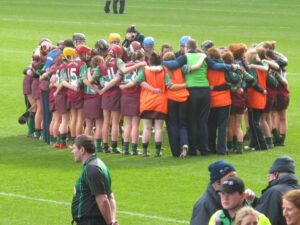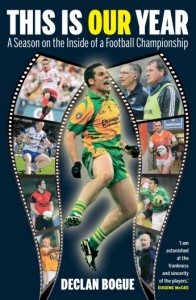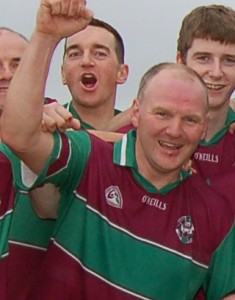
The Calm Before.
“It was the spring of hope, it was the winter of despair, we had everything before us. . .”
Eoghan Rua camogie won the All Ireland Intermediate Club Championship in March 2011, repeating the achievement in 2012. Those days in Croke Park were unforgettable for the players. The Chinese have a saying, the journey is the reward. It is a sentiment I can relate to.
The 2010/2011 Ulster and All Ireland campaign followed our first ever Derry senior championship success. Having defeated a good Clonduff side in the Ulster Final we were preparing for an All Ireland semi final against the Munster Champions. It was uncharted territory for us. Lavey had been down that road before providing inspiration and a reference point that we could be successful, even though the gradings at All Ireland level had changed.
My own involvement started a number of years earlier. How times have changed. I recall going in to one session at St Joe’s . The players stood in static lines of three pucking a few well-worn sliotars back and forth. There was no intensity worth talking about. A number of the same players are still involved. That level of operation wouldn’t be acceptable or tolerated by them now. They came a long way and matured as players, as individuals and as a group. Anyhow, back to Autumn 2010.
We were notified by the Camogie association that the All Ireland Final had been secured for Croke Park but that this would mean that rather than playing the competition off prior to Christmas with a final in later November at a county ground somewhere, the semi finals would be played in February. The Final would follow in Croke Park in March.
To be honest I personally groaned and grinned at the news. The former because it raised a whole new expanse of uncharted territory; the latter because in my wildest dreams I never for a moment thought I would be involved with any team in Croke Park other than as a supporter. I had watched an old teammate from school Noel Donnelly steer our alma mater Omagh CBS to a Hogan Cup title. I roared at him from the premier level that day and he replied with a thumbs up. In time a conversation with Noel was to be one of the most important pieces of advice I received about taking a team in Croke Park.
Having won Ulster we were embarking on a serious adventure. The team had limited experience playing outside Ulster, various players had county experience, some had played inter provincial and a few of them had won the Gael Linn. Others had experience at University level and others had played in Ulster College All Star teams. In 2009 we had entered a team in Kilmacud sevens and performed creditably.
Preparations continued, and by continued I mean the intensity of training was significantly stepped up preparing for Ulster, and then the All Ireland campaigns. My own view was that we had to incrementally increase the pressure for the higher-level competition we would encounter. It had to be incremental, and in fact the players often didn’t notice the greater intensity work, or if they did they didn’t complain (that much). At times sessions became brutal. I recall sitting next to a lad from Ballinderry at the County football final and he was telling me about work Mike McGurn had done with their senior footballers. It immediately gave me ideas. Over that winter I did a course with Ulster GAA that gave me plenty of food for thought. I also attended a couple of other events that enabled me to bring new fresh ideas to training in addition to material I drew up myself based on my perception of how and where we needed to improve as a team.
This Croke Park carrot meant a number of things in practice. Firstly although it was late October, we had to stand down our entire training programme. It was not possible to keep a squad in training for two months with no further games until February. The team would have gone stale and collapsed inwards on itself. Keeping the thing fresh was key. That then raised the issue, having taken the team off the boil completely, how could we get them back to the required standard. It posed plenty of challenges, not least for the players. Essentially we were asking them to maintain a high level of personal fitness over an eight-week period with no collective training.
In trying to plan for this I spoke to a number of coaches, including people within the club but more importantly and specifically St Gall’s manager Lenny Harbinson and Paddy Tally then Down coach. Both freely gave me advice on their own experience and offered a few pointers on the way in which to manage the situation and the players’ expectations. I owe both men a debt of gratitude and took great pleasure in contacting them after our first success to thank them for their sound advice.
In particular I would mention Paddy Tally because after our championship exit in 2009 to Lavey I wrote down all that was wrong with training, my own coaching and the group of players. It made difficult, challenging and uncomfortable reading for me personally, but it made it crystal clear that things had to change, starting with myself.
I had to find a way to re energise my own contribution, in the hope and ultimately in the confidence that it would help the players. In late 2009 Paddy gave me some simple pointers, showed me some of what he was doing and importantly why he was doing it. That meeting opened a new window on coaching for me. That and a session taken by Eamon O’Shea in early 2011 in Dunloy showed me what was possible with a little imagination added to the mix.
The suggestions Paddy and Lenny gave me helped me straighten out my own thinking and simplify things that were worrying me. As a consequence for example having initially been of the view that players involved with University squads should not play with them, I did an about turn and agreed that they should continue their commitments. These were after all competitive games and although there was a risk of injury the pros of a happy contented player outweighed the cons. Méabh McGoldrick, our captain was also captain of Jordanstown and to have been overly prescriptive would have resulted in an unhappy player. Méabh played away with Jordanstown and managed her joint commitments admirably. A light hand was the correct way to proceed there.
Without going into the details, for both winter campaigns, we congregated in December. We worked to a pre planned schedule of sessions I had designed to get the players back to fitness through a fairly brutal but condensed programme followed by a three week championship set up working on specific areas of play. The latter included matches, some of more value than others.
The players were required to train and play matches during the Christmas holiday, the quid pro quo being that I organised sessions in a way that the players could go out on St Stephen’s night, New Year’s Eve etc. I don’t believe in a drinks ban when you have a committed group of players and ours were highly committed during these two specific campaigns.
In addition to the normal season’s training the winter sessions involved in the region of 50 training sessions between December and February, a further 12 -1 5 between the semi finals and finals; video work, travelling to watch the potential opposition in marathon all day trips to Cork, Kilkenny, Westmeath, Laois and Tipperary. For each of those Brendan McLernon drove hundreds of miles at his own expense. The craic was good and we established a sort of standard routine. Brendan’s antics scouting the opposition team were priceless. He would eavesdrop on team talks; size up players during post match celebrations dictating notes into the ubiquitous machine. These scouting trips were the bedrock of success in 2011 and 2012. Yes it was a total pain in the arse leaving home at 6:30am to drive to Buttevant or Durrow but the notes, tape and observation were beyond price. You get a sense of what you are dealing with observing another squad in action. It is hard to describe but it was an essential part of the method.
For every training session over the winter we provided food and water for our players. For the first campaign that was dealt with from within our own resources i.e. team management. For the second year the club organised a rota amongst members to ensure that every session was provided for in terms of food. This was particularly important because we had a number of players travelling from Belfast, often leaving work to come straight to training on a Tuesday and Friday. We started sessions a bit later to accommodate the travellers but that meant in turn they were later on the road back to Belfast.
That winter the weather was particularly horrendous with terrible snow. It is to our credit we only had to cancel one session. Twice I had the players on the beach in temperatures hovering around minus ten. On Boxing Day we trained on a small patch of sand as steam came off the nearby sea. The players were put through a savage running programme with limited recovery. One passed out in the cold, another tore a hamstring from inadequate warm up. Thermal tops and leggings were compulsory. It was savage stuff. One day heading to Dunloy for an indoor session another player badly damaged her car skidding on ice.
During the second campaign one player came to me and pleaded to go home after a 40-minute session in torrential rain and wind at the University. Under the floodlights, the windmill spun in the darkness, we couldn’t see it but we could hear the sound, as the floodlight illuminated the 45-degree sleet and rain and the waterlogged field. The water was lying on the pitch as players completed a stamina running figure of eight routine with little ballwork. The twelve or so players that came out that night will not forget it. Others either couldn’t make it from Belfast or assumed the session wouldn’t be on. They should have known better.
Not having lights ourselves at our club pitch, we had to train in other locations midweek. During the 2011 winter we used the lights at Coleraine rugby club twice a week. We were immensely grateful for their cooperation even if it was a costly exercise. There were some in the club ranks that raised an eyebrow at both the venue and the costs but we needed somewhere to train. My view on this and other matters was that I was prepared to do whatever it took, and wherever the task took me to ensure the players had every chance of success in their campaigns.
In 2012 we used the new lights at the University of Ulster which meant we were able to train on a proper Gaelic pitch for all of our sessions. This was a significant bonus and not to be underestimated. There are times since that I have gone in there, and looked round, the place deserted. It was our laboratory, the teams tactics and strategies were forged in that place night after night. It was in there that we worked on the elements that ultimately won us the match against Ardrahan.
In terms of financial costs, the first year our campaign involved overnight stays in Dublin twice (the first day our semi final was postponed due to a waterlogged pitch). For the replay the game was at the last moment on the Thursday fixed for Cloughjordan in Tipperary. Whatever chance of travelling to Dublin on the day of the match, this required an overnight stay. This time in Birr. The three overnighters cost in the region of £3000 each for accommodation, coach and food and other expenses.
On these overnight stays we got our routine in place. Mass if we could get it that evening rather than in the morning; dinner, team meeting and then players could do as they pleased. Some went for a swim, some went to the physio. It was kept as relaxed as possible. My abiding memory is that once we got on that big Yellow Chambers Bus, the squad was together, the players were happy in the company of their teammates. The routine was similar, the atmosphere relaxed and the craic good.
Looking back there were some magical moments along the way, and as someone said to me today, it is only when something is gone that you realise how much you miss it.
“In the midst of winter I finally learned that there was within me an invincible summer.”
The Journey was the reward.




